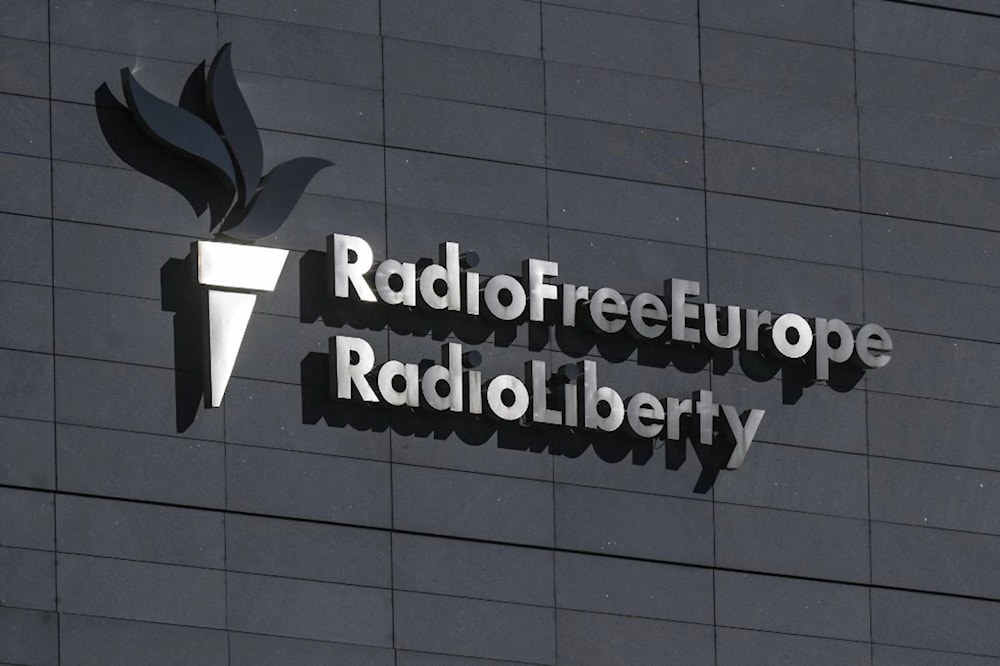US state-funded media puts employees on unpaid leave
Radio Free Europe/Radio Liberty (RFE/RL) says that it has run out of funds because of Donald Trump’s executive order.
-

The logo on the facade of the headquarters of Radio Free Europe/Radio Liberty (RFERL) in Prague, Czech Republic, undated. (AFP)
The US state-funded broadcaster Radio Free Europe/Radio Liberty (RFE/RL) began furloughing employees at its Prague headquarters on Tuesday due to the absence of congressional funding for April.
Originally established to promote pro-Western messaging in the Soviet bloc during the Cold War, RFE/RL was initially financed by the CIA and now relies on grants from the US Congress.
The news organization stated on Tuesday that, despite the court ruling, it has yet to receive additional government funding.
The news outlet wrote on its website that despite USAGM retracting its letter to terminate RFE/RL's grant agreement on March 26, the news organization has not received any of its congressionally allocated funds since then, and USAGM has yet to approve RFE/RL's financial plan for April.
RFE/RL stated that it has requested the judge to issue a temporary restraining order to secure its funding for April, along with an injunction to ensure financial support for the remainder of the fiscal year.
In a statement, RFE/RL President and CEO Stephen Capus said, "Our staff and their families are now paying the price as RFE/RL continues to wait for USAGM to provide our congressionally appropriated funds."
The White House claimed that the move to defund RFE/RL was part of Trump’s broader effort to reduce public spending and eliminate "unnecessary" bureaucracy.
Tech billionaire and Trump advisor Elon Musk, who heads the Department of Government Efficiency (DOGE), has called for the shutdown of RFE/RL, stating, "Nobody listens to them anymore," on X in February.
"It is just radical left crazy people talking to themselves while torching $1 billion a year of US taxpayer money," Musk said at the time.
EU weighs funding for Radio Free Europe
On a related note, the European Union debated on March 17 whether to provide financial support for RFE/RL following the United States' decision to cut its funding. EU foreign ministers discussed the issue in a meeting the day before but did not commit to filling the gap left by Washington.
EU Foreign Policy chief Kaja Kallas acknowledged the significance of RFE/RL’s work but cautioned that financial support would not be immediate or automatic.
"This issue of Radio Free Europe was raised ... Of course, it is sad to hear that the US is withdrawing its funding. Now the question for us is, can we come in with our funding to fill the void that the US is leaving? The answer to that question is: not automatically, because we have a lot of organizations who are coming with the same request to us, but there was really a push from the foreign ministers to discuss this and find a way. So, this is the task on our side; to see what we can do," Kallas stated following the meeting.
The debate came after Trump signed an executive order on March 14 aimed at reducing federal bureaucracy, which included significant cuts to the United States Agency for Global Media (USAGM). USAGM oversees RFE/RL and Voice of America (VOA), both of which have faced criticism for their editorial stance. Critics argue that these outlets have historically promoted anti-Russian propaganda and sought to delegitimize governments whose policies do not align with Western interests.

 3 Min Read
3 Min Read










